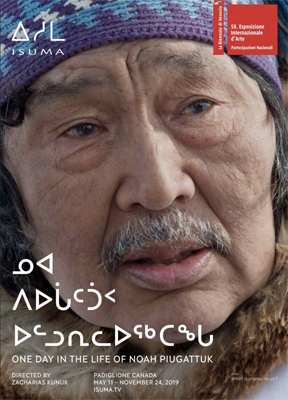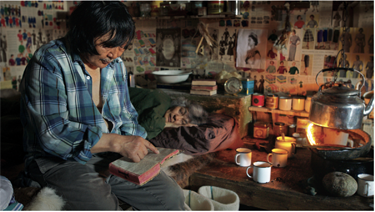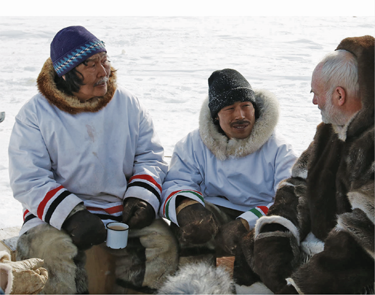In this Post
From the
Editor
Passage: William John ‘Qimmiliriji’ Carpenter
QIA, Canadian Government Settlement
Media review: Red Serge and Polar Bear Pants
Media review: One Day in the Life of Noah Piugattuk
Update: A Book is Born
Passage: William John ‘Qimmiliriji’ Carpenter
QIA, Canadian Government Settlement
Media review: Red Serge and Polar Bear Pants
Media review: One Day in the Life of Noah Piugattuk
Update: A Book is Born
Navigating This Site
Index of articles by subject
Index of Journal editions by
volume number
Index of PostScript editions by publication number
Search The Fan Hitch
Articles to download and print
Ordering Ken MacRury's Thesis
Our comprehensive list of resources
Defining the Inuit Dog
Talk to The Fan Hitch
Shop & Support Center
The Fan Hitch home page
Index of articles by subject
Index of Journal editions by
volume number
Index of PostScript editions by publication number
Search The Fan Hitch
Articles to download and print
Ordering Ken MacRury's Thesis
Our comprehensive list of resources
Defining the Inuit Dog
Talk to The Fan Hitch
Shop & Support Center
The Fan Hitch home page
Editor's/Publisher's
Statement
Editor: Sue Hamilton
Webmaster: Mark Hamilton
The Fan Hitch Website and
Publications of the Inuit Sled Dog– the
quarterly Journal (retired
in 2018) and PostScript – are dedicated to the
aboriginal landrace traditional Inuit Sled
Dog as well as related Inuit culture and
traditions.
PostScript is
published intermittently as
material becomes available. Online access
is free at: https://thefanhitch.org.
PostScript welcomes your
letters, stories, comments and
suggestions. The editorial staff reserves
the right to edit submissions used for
publication.
Contents of The Fan Hitch Website and its publications are protected by international copyright laws. No photo, drawing or text may be reproduced in any form without written consent. Webmasters please note: written consent is necessary before linking this site to yours! Please forward requests to Sue Hamilton, 55 Town Line Rd., Harwinton, Connecticut 06791, USA or mail@thefanhitch.org
Contents of The Fan Hitch Website and its publications are protected by international copyright laws. No photo, drawing or text may be reproduced in any form without written consent. Webmasters please note: written consent is necessary before linking this site to yours! Please forward requests to Sue Hamilton, 55 Town Line Rd., Harwinton, Connecticut 06791, USA or mail@thefanhitch.org

ISUMA Distribution International
One Day in the Life of Noah Piugattuk
A Zacharias Kunuk film
reviewed by Sue Hamilton
ISUMA’s award winning One Day in the Life of Noah Piugattuk depicts just that. But it’s not just any day. Noah Piugattuk, born on the land in 1900, and his band are still living a nomadic lifestyle at Kapuivik near present day Igluliq. It is obvious he has already been exposed and in some ways transformed by the influences of outsiders. As the movie unfolds, Piugattuk’s, now an Anglican, reads from the bible, “If you have heard Him and been taught by Him as the truth is in Jesus, turn away from your old way of life and be born again.” In a scene later in the film he chastises his daughter for flirting with an Inuk boy saying, “You can’t marry a Catholic.” Piugattuk has also been introduced to white men’s things: tea, tea kettle, tobacco, sugar, jam, biscuits, cloth clothing, plywood, firearms. This remains in contrast, for example, to the stone qulliq (seal oil lamp) which provides Piugattuk’s sod house with warmth, cooking fuel and light by which he reads his bible while his wife is seen pulling apart single strands of sinew for sewing. Piugattuk’s band trades some of the meat they harvest from land, sea and air for the white men’s material things Inuit find useful and enjoyable.
During a tea break in May 1961 while out hunting seals, Piugattuk’s family and members of his band watch as a dog team approaches. Two Inuit are recognized but the third is a stranger, a qallunaaq. Filmmaker Zacharias Kunuk contrasts this qallunaaq by the way he is dressed. Like American westerns of old where the good guys wore white hats and the bad ones wore black, this qallunaaq wore all dark caribou fur clothing while all Inuit wore white fabric anoraks with light colored seal skin pants. That this stranger needs a translator and has a brusk and powerful handshake, even though it is explained how Inuit greet each other, gives rise to suspicion amongst the hunting party.
It is not at all unusual for such visitors to bring goods that are known to be favored by “locals”, in this case tea, sugar, biscuits, jam, tobacco, caribou. However, the motivation for these offerings at this particular encounter may not be altruistic. Time passes allowing the group to enjoy these things before the real purpose of the assembly is revealed. One of the two Inuit who accompanies the qallunaaq serves as his translator. While the usual activity that might take place during a tea break out on the ice carries on in the background, it is the discussion between the three main characters: Elder Noah Piugattuk, Evaluarjuk the translator and the qallunaaq referred to as Boss, also known as Isumataq (“he who thinks for us”), that occupies this day’s events and most of the balance of the film.
If one who is completely unfamiliar with mid-twentieth century Inuit history senses an ominous tone, they would be entirely correct. The film represents a window into the Canadian government’s plan for arctic sovereignty. Boss is eager to hold a meeting where he inquiries about identity numbers and then informs Piugattuk, the band’s leader, that Canadian law says Inuit must move off the land and into a settlement, in this case Igloolik. “I understand you love the land but children have to go to school! You have to move! ” He both threatens and cajoles Piugattuk, saying that Inuit children MUST attend the white man’s schools and that it would be a shame if the adults remained on the land apart from their children. This time he sounds like living in the settlement is an option. He then tries to lure compliance by saying families will be provided with a wooden house and a cooking stove for only two dollars a month, and they will receive their monthly allowance. Nurses will be in the settlement to take care of Inuit who become ill. He is emphatic that nothing will change for Inuit who relocate to the settlement. (What a tragic non sequitur that ultimately turns out to be!) They can earn money selling what they harvest from the land or by taking people out on the land or by having government jobs. And the money would be theirs to save and spend as they desire. But these Inuit are unfamiliar with a wage earning economy. “I wonder what money is,” Piugattuk asks, turning to other men observing the meeting, “Are you learning about money?”, to which they reply, “I heard about it but I don’t understand it.”
The cultural divide and the intransigence between Piugattuk and Boss are too wide to reach compromise. What makes these interchanges even more difficult is that Evaluarjuk himself does not perfectly understand either the English language or the white man’s way of life. He struggles to interpret what is being said from one man to the other, sometimes interjecting his own version of what he thinks should be said. Candice Hopkins wrote in her July 2019 essay in The Isuma Book, “Evaluarjuk is the government-hired translator and Piugattuk's relative, who has the untenable role of translating a tense negotiation even when each man doesn't hear what the other has to say. As a character, Evaluarjuk embodies the contradictions of colonialism and the encounter with modern Inuit self-determination.”
The day wears on. Shadows lengthen and it is getting cold. But after a short break, Boss wants to resume the meeting. He is pushing for an answer, the one that will go his way. So he asks over and over again about relocating to the settlement and Piugattuk, encouraged by his men, urge him to refuse to comply. Both Boss and Piugattuk are becoming increasingly frustrated. Boss’s voice is showing strain and Piugattuk is showing his indignation by pushing Boss’s extended hand off his knee then ceremoniously brushing off his knee as if he wants no trace of the white man’s presence on his pants or indeed his life. Boss says, “The settlement is your home!” Piugattuk replies, “Kapuivik is my home, yours is Canada!”

In their sod house, Noah Piugattuk reads his bible while his wife rests.
ISUMA Distribution International
It is three decades later and in 1992 the real Noah Piugattuk, now ninety-two year-old, is seen sitting down in front of a microphone at a recording studio in Igluliq. His hand waves to the beat of his solo voice’s ayaya song:
In 1996 Noah Piugattuk died in Igluliq at the age of ninety-six.I am thinking of the sea ice.
I am pulling on this leash and I can’t hang on.
I am eager to go to sea ice.
I’m longing and I can’t hang on.
It’s impossible for me to get to the sea ice
One Day in the Life of Noah Piugattuk is one of the slowest paced and quiet movies you are likely to ever see. It is principally about a three-way dialogue. But this film works, oh does it ever, thanks to the high quality acting all around but especially the performances of Apayata Kotierk as Noah Piugattuk and Kim Bodnia as Boss (Isumataq). The greatest praise, however, must go to Benjamin Kunuk as Evaluarjuk, the translator, for a brilliant job expressing the strain of laboring to facilitate communication between two men from different worlds.

Noah Piugattuk and Boss engage in a verbal battle of wills while Evaluarjuk
the translator (center) struggles to make the two understand each other.
ISUMA Distribution International
Be sure to visit the ISUMA.TV website for many details about Noah Piugattuk and the making of this film. The Isuma Book will be available to purchase here. This site includes a wealth of information about the movie including scripts in both English and Inuktitut, fascinating essays such as “He still can’t speak Inuktitut for himself: translations and mistranslations in One Day in the Life of Noah Piugattuk” and all about the history of the government’s plan for Canadian Arctic sovereignty and the impact of that on Inuit.
One Day in the Life of Noah Piugattuk is available to rent or purchase from iTunes but is not as of yet available as a DVD.